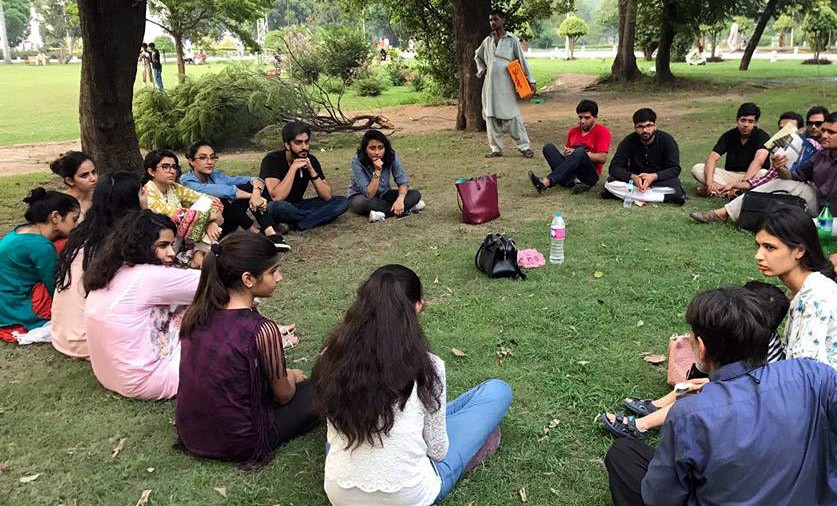
A discussion, organised by Girls at Dhabas, sought to make people realise how they as a society pose a risk to the life of anyone who refuses to conform

July 15, 2017 was a significant day. Exactly a year before, on this very date, a most horrific incident took place which may have rattled many of us and may have unaffected or even relieved some of us: Qandeel Baloch, a social media sensation who challenged the hypocrisies and double standards in our society and exposed us for who we really are, was killed by her brother, in the name of honour.
Of course, what Baloch meant to us and why she was killed is a topic that calls for discussion. A conversation, titled ‘Let’s talk Qandeel,’ was held by Girls at Dhabas, a community organisation for women, at the Bagh-e-Jinnah, where I soon found myself listening to some very exciting discourse.
Before this event took place, there were some ground rules and one of these was that though men could attend, they would not participate. Some might call this discrimination but I found it to be quite a good idea because, in essence, Girls at Dhabas works to help women claim their spaces and give them an opportunity to speak and share their views. In the end, however, men were allowed to speak but only after every woman had shared her own input.
The real talk started with Baloch’s real name, Fauzia Aleem, and why this young lady needed to hide behind the pseudonym, and what this means for classism. ‘Baloch’ is a name that commands respect and, perhaps, Qandeel believed that with this new identity, her real self would be protected.
But this also speaks volumes of how even though the independent women who seek to challenge the norms of society are despised, those from more privileged backgrounds are given certain protections and do not really worry about being persecuted. Qandeel Baloch certainly needed protection because as a woman who was always up in our faces, she ‘infuriated’ us and showed us our own real selves.
Not just that. By owning the work that she did, and making a living out of it, many men started feeling infuriated because in doing so, Baloch had showed them that they only view women as sex objects.
Sitting in a close circle, all participants were asked to share moments from the life Baloch had portrayed to us which had stayed with and taught us something. Quite a few present at the event agreed that what they loved about her was that she was so unapologetic about who she was and chose to ‘shamelessly’ live her life. How she bravely shut down all her haters was another aspect about her that people loved.
There are some very human aspects to her story which everyone felt they could connect with. For instance, the "how I’m looking" video. Like her, we all have at some point in our lives asked this to our friends, loved ones and significant others, and sought validation from them, haven’t we?
Later, the topic brought up was her death and how it hit us so hard. This might be due to the fact that Baloch, because of being an internet sensation, was everywhere all the time, whether it was online, through her numerous posts where she created a relationship with her viewers, or offline when she was mostly always a hot topic at our GTs.
Her death might have shaken us because in a way, we felt responsible for what had happened to her. When she was alive, we might have made fun of her, or looked on silently while people spread hate about her. Never did we think that this person, who had suddenly become so real to us, would ever lose her life.
It a really scary thought. In her last few days, she did ask for help many a time from the authorities, stating over and over again that her life was in danger. All her pleas were conveniently ignored by all of us, and though it sounds as though I am saying that by not helping her we were directly responsible, what I really mean is that, from the start, if we as a society had been a bit mindful of the things we said and had refrained from incorporating ideas of shame and honour in our comments, maybe her true identity wouldn’t be revealed and things wouldn’t have come to the point that they did.
A year since her tragic killing, we all seem to have learnt a thing or two. At the Girls at Dhabas event, what I discovered about people was that some of them have now become more mindful of the impact their actions can have, how they often ruin someone’s life without even realising it.
The event sought to make us realise that we should think about the risk our society poses to the lives of anyone who refuses to conform. Nasir Khanjan is another internet star who is hated and routinely trolled as he too is thought of as bringing shame to our society because he challenges the patriarchy and the stereoptypical roles assigned to genders, through his videos.
It also made us realise that we need to stop being so judgmental and start accepting people as human beings and allowing them to live their lives without existing in a state of constant fear all the time.
Towards the end of the discussion, we returned to what we had begun with and celebrated Qandeel Baloch for her courage and refusal to back down till the very end.
This article was published in The News on Sunday on July 23, 2017 under the title A beacon for women.